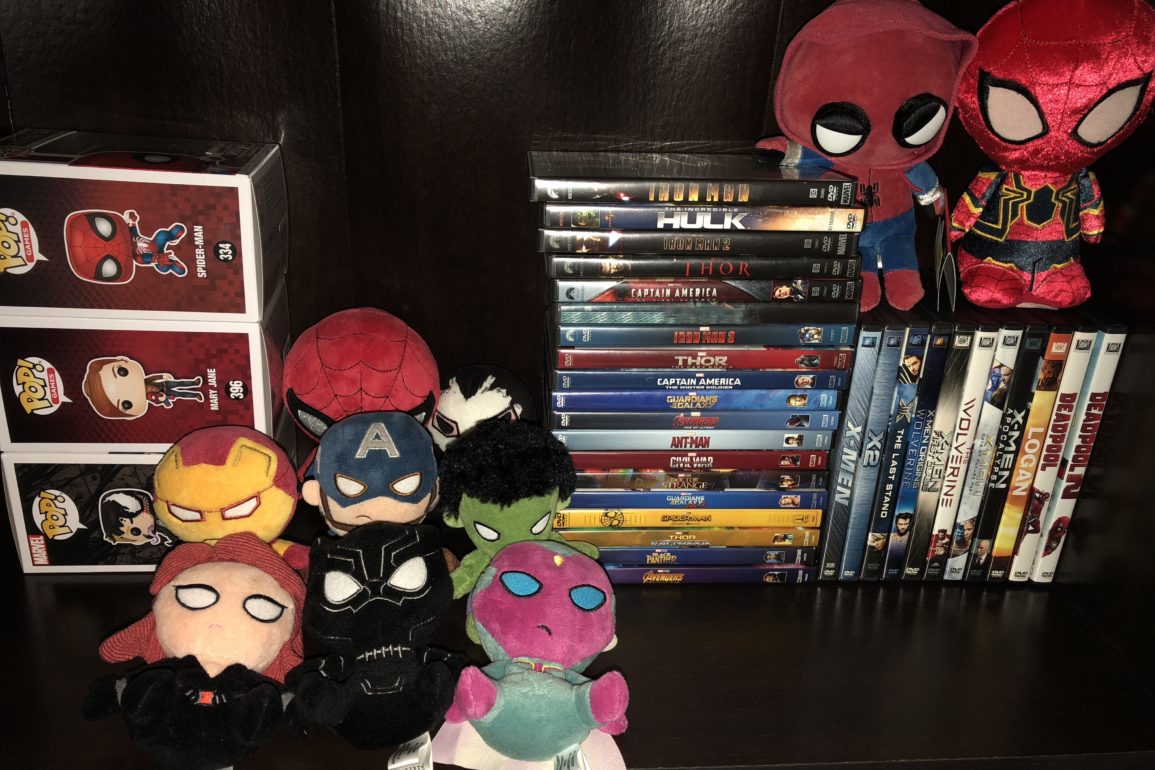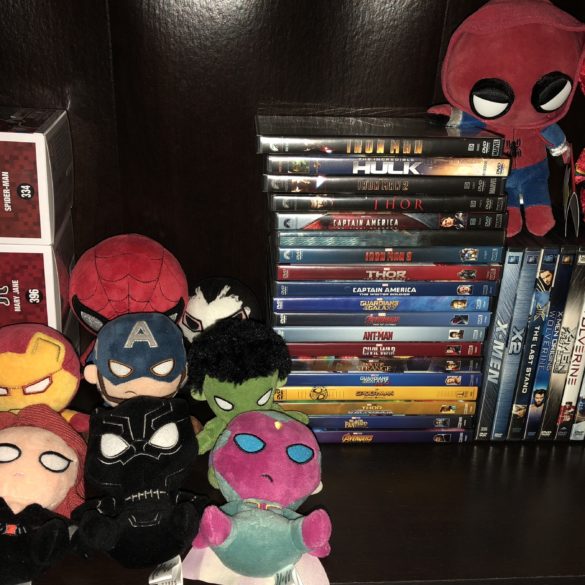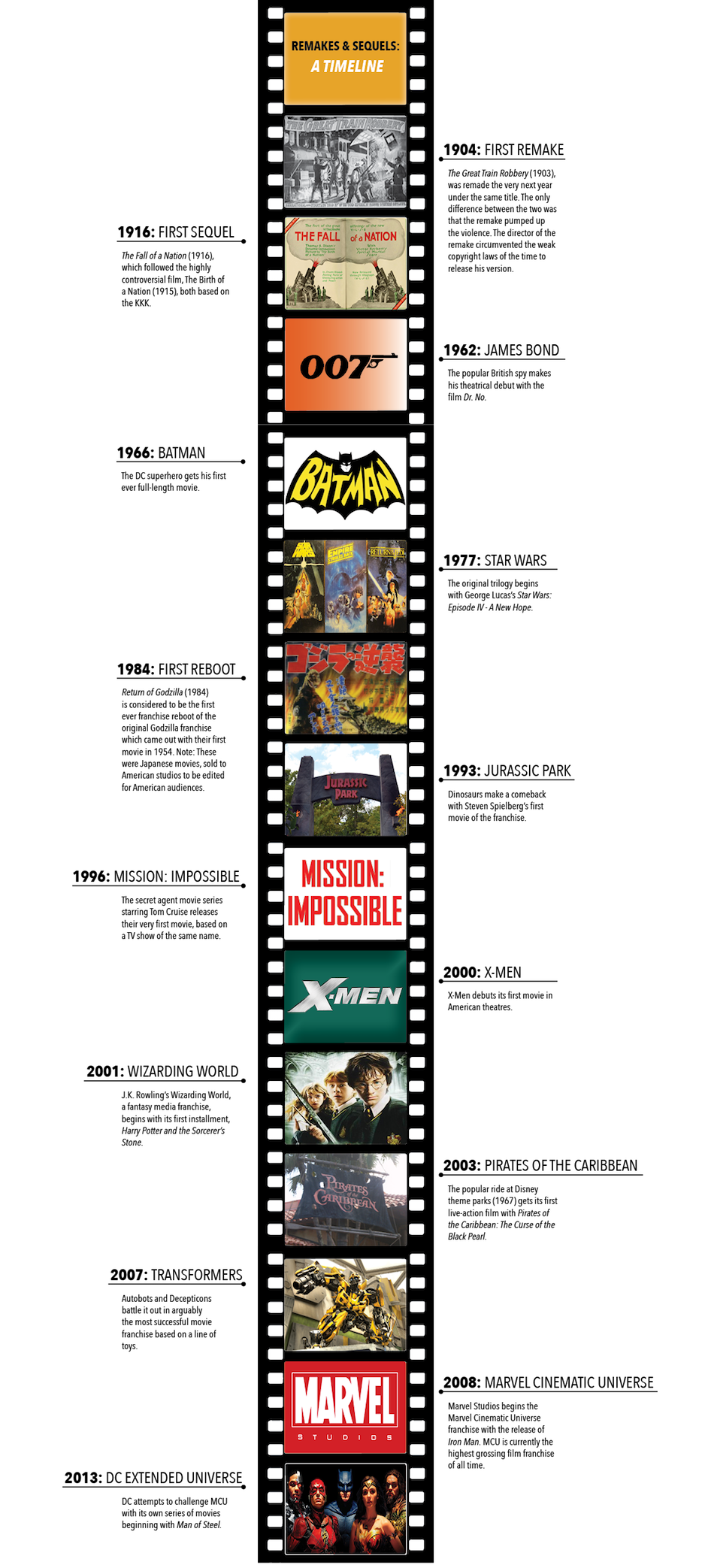The film industry uses nostalgia to connect with viewers, building on existing franchises that attract past fans and new audiences alike.
Where did Captain America hide Nick Fury’s super secret flash drive in Captain America: The Winter Soldier?
Such a specific question could only be answered by a true fan of the Marvel franchise, like Keegan Dean, an art student at Ball State University whose team, Infinity Bois, took part in a trivia contest based on the Marvel Cinematic Universe.
Keegan’s love of Marvel extends all the way back to when he was a kid watching the animated Spiderman TV series. Keegan’s mother would buy him Spiderman-themed toys and plushies, some of which he still has.
Keegan, like many kids in the late 1990s and early 2000s, grew up on these superhero stories that later turned into live-action movies and TV shows.
The Marvel Cinematic Universe is among the several franchises that regularly top the charts with blockbuster hits. The future of Hollywood might increasingly belong to these stories that have time and again been presented to audiences through remakes, sequels, and reboots.
Jonathan Kuntz, a professor and film historian at UCLA, says this isn’t new to the 21st century.
“It’s something Hollywood has always done,” says Kuntz. “Hollywood wants to minimize the risk in what they’re putting out.”
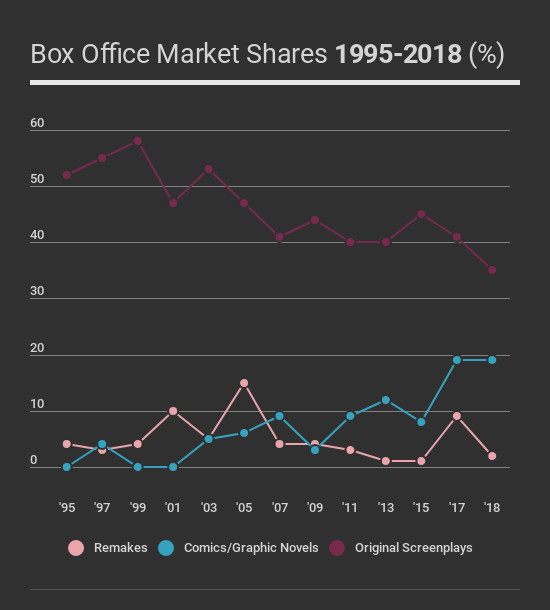
In the history of American cinema, Kuntz says popular novels were made into plays, which some of the first silent films were based on. These were then remade with sound, and as color films dawned in, black and white films were remade as well.
“We’ve always had this idea that if something is successful, let’s copy it or sequelize it, or do a reboot,” says Kuntz.
According to the Numbers website, since 1995, the frequency of movie remakes has fluctuated year after year. However, movies based on comic books saw a notable increase in 2009, especially since the advent of the Marvel Cinematic Universe in 2008. Meanwhile, original screenplays have seen a nearly 17 percent decrease in market share since 1995.
“I don’t know that this means that Hollywood is any less creative than it ever was,” says Kuntz. “Because, again, Hollywood has always been redoing stories.”
Over time, Hollywood has started focusing more resources on big-budget films and less on small and medium-sized original screenplays. A process of consolidation from bigger companies has left six major movie giants today. But that number will lower to five when Disney buys out 21st Century Fox next year, and potentially decline even further in the future.
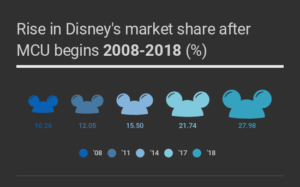
Disney has pursued a policy of acquiring the most successful and expensive franchises, such as Marvel, Star Wars, and Indiana Jones, says Kuntz. Disney is also in the midst of converting their most popular animated movies into live-action films.
According to the Numbers website, Disney accounted for 19 percent of the box office market share in 1995. This number is now nearly 30 percent, far aheadof the closest competitor, Warner Bros., at 15 percent. Disney’s 2018 success can be attributed to Black Panther, Avengers: Infinity War, and Incredibles 2, which are the highest grossing movies of the year so far.
“You could say that Disney has an unfair monopoly in the area of franchises,” says Kuntz. “But that’s only because they’re so good at it. They brought in the Marvel Comics franchise, and over the past 10 years, they turned it into a series of super smash hits.”
However, Kuntz also says owning a popular franchise does not automatically guarantee success, giving examples of Warner Media’s struggle with the DC comics franchise and Universal’s flopped reboot of The Mummy franchise last year.
“You’ve got to congratulate Disney a little bit for not only having the franchises,” Kuntz says, “but also for handling them so well that they are ongoing successes.”
Kuntz says Marvel’s success has shown that investing in franchises by hiring young filmmakers to come up with innovative ideas helps keep them going every single year.
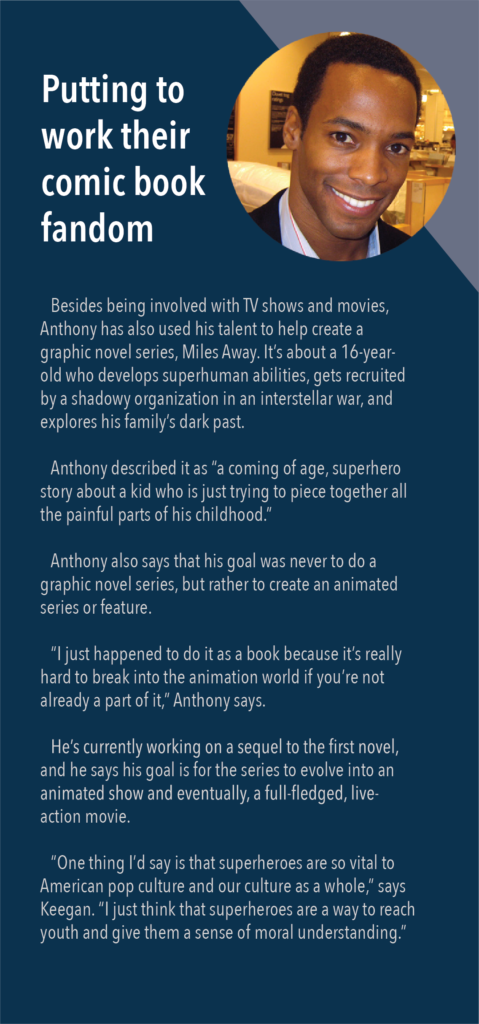
The success of franchises is also based on emotions from casts and audiences. Some popular old stories might provide powerful messages to audiences across generations.
Anthony Montgomery, a Ball State alumnus who pursued acting, played the role of Travis Mayweather in the early 2000s TV series Star Trek: Enterprise.
“It was incredible,” says Anthony. “Just to be a part of a legacy like the Star Trek franchise was something nearly unimaginable for me as a kid from Indianapolis.”
After Ball State, Anthony went through the grind of Hollywood in the late 1990s, doing small roles while facing rejections and a show cancellation. He says his life has shifted ever since his job with Star Trek: Enterprise. Anthony has since appeared in a number of popular TV shows, most notably as Dr. Andre Maddox on General Hospital. This year, his role on General Hospital earned him a Daytime Emmy Award nomination for outstanding supporting actor in a drama series.
During his role in Star Trek: Enterprise, Anthony felt like he needed to live up to what Gene Roddenberry, the original creator of Star Trek, had started.
“Ultimately, we just gave everything we could to make the best show possible,” he says.
Many Star Trek fans who didn’t see the show during its 2001 to 2005 run have found a new appreciation for Enterprise through its availability on popular subscription platforms such as Netflix, Amazon Prime Video, CBS All Access, and Hulu.
For Keegan, the Marvel Cinematic Universe offers more than just childhood nostalgia.
“I grew up without any friends as a kid, and I was constantly bullied,” says Keegan. “And so superheroes were always a way for me to escape.”
To him, the movies provided inspiration. Keegan believes heroes show that it’s okay to be yourself, do the things you like, and do good for the world.
“And now, the kids who bullied me in school are wearing these heroes on their T-shirts,” says Keegan. “They always made fun of me for doing the same thing.”
Anthony also grew up reading comic books and loving superheroes, which he says was an escape from the pain he faced during childhood.
“And it just so happens that my childhood fandom has caught up with society, and now it’s cool to be a superhero and to want to be a part of all that,” says Anthony. If it wasn’t for the Star Trek franchise, he says he’d love to play a part in the Marvel Cinematic Universe.
“I like Marvel a lot because they show that heroes can make mistakes, and they always want to fix it and remedy it, and we should always strive to be the best that we can be, no matter what,” says Keegan. “I think that’s a really good message to give to people.”


